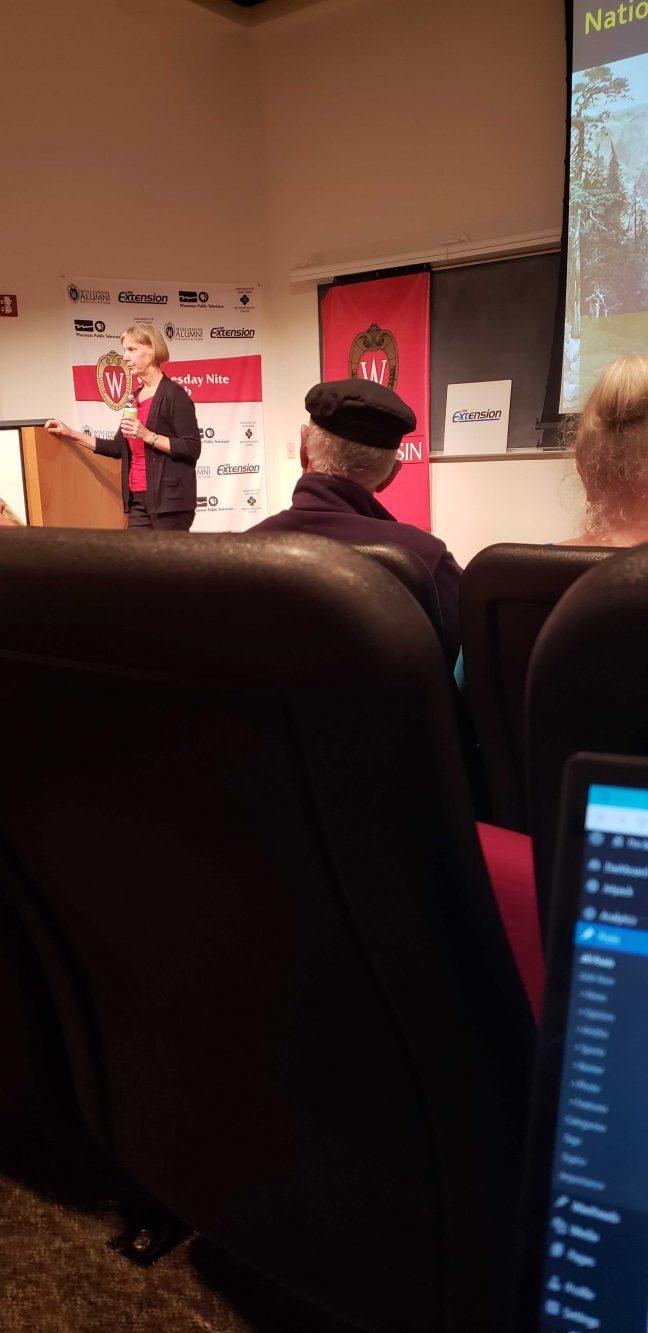A panel of experts discussed the need for diverse perspectives in STEM education at the Discovery Building Thursday as a part of the Wisconsin Science Festival.
Director of the University of Wisconsin’s Earth Partnership Initiative Cheryl Bauer-Armstrong talked about her organization’s commitment to an accessible science education for all. The Earth Partnership’s Indigenous Arts and Sciences initiative focuses on teaching environmental stewardship and restoration through cultural topics, Bauer-Armstrong said.
Bauer-Armstrong said her organization seeks to provide indigenous communities with an education focused not only on science, technology, engineering and math but also arts, all through a cultural lens.
“Arts and sciences, you can’t separate the two,” Bauer-Armstrong said.
Also associated with the Earth Partnership is Bad River Education Coordinator Lori Lemieux. Lemieux runs programming focused on bringing natural science education to her community and connecting science with tribal leadership and culture.
Soil scientist discusses soil crisis, calls for higher public awareness
Lemieux said her program provides students with research tools and educational opportunities. They work with UW as well as the University of Minnesota and other scientific organizations with a goal of connecting communities around science and encouraging sustainability and environmental harmony.
“We have a responsibility to encourage a sustainable, healthy lifestyle for all humankind,” Lemieux said.
Executive Director of the Illuminating Discovery program through the Wisconsin Institute for Discovery Ginger Ann Contreras’ job entails bringing science and art to underserved communities. She runs the Discovery Institute’s Science to Street Art and Science to Script programs. These programs encourage young people to think both critically and creatively while learning and having fun, she said.
Contreras’ background is both Latinx and First Nations, she said, and she said these programs work to bring science to diverse backgrounds. Science to Street Art pairs students with street artists to explore different techniques and art forms, while also connecting the street art with science curricula. They produce murals across Madison.
Science to Script connects storytellers with scientists in order to portray accurate, diverse perspectives of science in the media — for example, Contreras said only one third of scientists in movies, TV and other media tend to be women, and even less so women of color. This initiative seeks to change that. Contreras said moving forward, she hopes to integrate virtual reality technologies into her programming.
Contreras brought up two core questions integral to her organization’s goals.
Science writers discuss public perceptions, misconceptions about science
“What does science miss when it does not include diverse perspectives and practices?” Contreras said. “What do scientists and science learners lose when they do not have opportunities to incorporate their diverse perspectives and practices within science?”
Director of Development at the Discovery Institute Derrick Smith spoke about his experiences as a black man in science. He posed the question, “Who doesn’t own science?”
Smith said he and his black colleagues constantly encounter negative messaging from their white colleagues on a monthly, weekly and even daily basis.
“One of the things about being in my position, being a black man in science, is that you don’t belong,” Smith said. “You don’t have the aptitude.”
Smith challenged these messages and encouraged administrations to seek out people of color for positions of authority from spaces that aren’t traditionally white.
Climate change can lead to, exacerbate effects of severe wildfires, ecologist says
Administrator for the Division of Intergovernmental Relations Dawn Vick answered the question ‘who owns science’ from a tribal standpoint. She pointed out how multiple state government agencies own data about tribal health. But she said independent tribal governments have established relationships with the state to collaborate and support the state data with their own.
Environmental science graduate student Dorothy Lsoto said it’s easy to be discouraged when you’re not supported or represented in the scientific field.
“If I don’t see people like me, then I’m not encouraged,” Lsoto asked. “Then how do I see myself in that position? Who owns science? It’s a difficult question.”
The panelists all answered the question ‘who should own science?’ Almost everyone responded with “all of us.”














